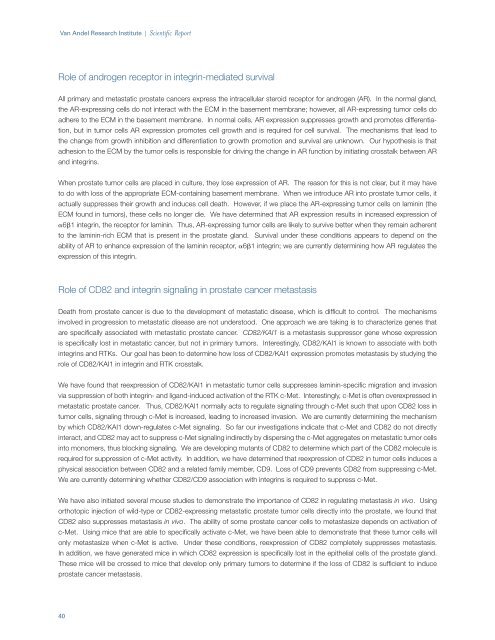2008 Scientific Report
Create successful ePaper yourself
Turn your PDF publications into a flip-book with our unique Google optimized e-Paper software.
Van Andel Research Institute | <strong>Scientific</strong> <strong>Report</strong><br />
Role of androgen receptor in integrin-mediated survival<br />
All primary and metastatic prostate cancers express the intracellular steroid receptor for androgen (AR). In the normal gland,<br />
the AR-expressing cells do not interact with the ECM in the basement membrane; however, all AR-expressing tumor cells do<br />
adhere to the ECM in the basement membrane. In normal cells, AR expression suppresses growth and promotes differentiation,<br />
but in tumor cells AR expression promotes cell growth and is required for cell survival. The mechanisms that lead to<br />
the change from growth inhibition and differentiation to growth promotion and survival are unknown. Our hypothesis is that<br />
adhesion to the ECM by the tumor cells is responsible for driving the change in AR function by initiating crosstalk between AR<br />
and integrins.<br />
When prostate tumor cells are placed in culture, they lose expression of AR. The reason for this is not clear, but it may have<br />
to do with loss of the appropriate ECM-containing basement membrane. When we introduce AR into prostate tumor cells, it<br />
actually suppresses their growth and induces cell death. However, if we place the AR-expressing tumor cells on laminin (the<br />
ECM found in tumors), these cells no longer die. We have determined that AR expression results in increased expression of<br />
a6b1 integrin, the receptor for laminin. Thus, AR-expressing tumor cells are likely to survive better when they remain adherent<br />
to the laminin-rich ECM that is present in the prostate gland. Survival under these conditions appears to depend on the<br />
ability of AR to enhance expression of the laminin receptor, a6b1 integrin; we are currently determining how AR regulates the<br />
expression of this integrin.<br />
Role of CD82 and integrin signaling in prostate cancer metastasis<br />
Death from prostate cancer is due to the development of metastatic disease, which is difficult to control. The mechanisms<br />
involved in progression to metastatic disease are not understood. One approach we are taking is to characterize genes that<br />
are specifically associated with metastatic prostate cancer. CD82/KAI1 is a metastasis suppressor gene whose expression<br />
is specifically lost in metastatic cancer, but not in primary tumors. Interestingly, CD82/KAI1 is known to associate with both<br />
integrins and RTKs. Our goal has been to determine how loss of CD82/KAI1 expression promotes metastasis by studying the<br />
role of CD82/KAI1 in integrin and RTK crosstalk.<br />
We have found that reexpression of CD82/KAI1 in metastatic tumor cells suppresses laminin-specific migration and invasion<br />
via suppression of both integrin- and ligand-induced activation of the RTK c-Met. Interestingly, c-Met is often overexpressed in<br />
metastatic prostate cancer. Thus, CD82/KAI1 normally acts to regulate signaling through c-Met such that upon CD82 loss in<br />
tumor cells, signaling through c-Met is increased, leading to increased invasion. We are currently determining the mechanism<br />
by which CD82/KAI1 down-regulates c-Met signaling. So far our investigations indicate that c-Met and CD82 do not directly<br />
interact, and CD82 may act to suppress c-Met signaling indirectly by dispersing the c-Met aggregates on metastatic tumor cells<br />
into monomers, thus blocking signaling. We are developing mutants of CD82 to determine which part of the CD82 molecule is<br />
required for suppression of c-Met activity. In addition, we have determined that reexpression of CD82 in tumor cells induces a<br />
physical association between CD82 and a related family member, CD9. Loss of CD9 prevents CD82 from suppressing c-Met.<br />
We are currently determining whether CD82/CD9 association with integrins is required to suppress c-Met.<br />
We have also initiated several mouse studies to demonstrate the importance of CD82 in regulating metastasis in vivo. Using<br />
orthotopic injection of wild-type or CD82-expressing metastatic prostate tumor cells directly into the prostate, we found that<br />
CD82 also suppresses metastasis in vivo. The ability of some prostate cancer cells to metastasize depends on activation of<br />
c-Met. Using mice that are able to specifically activate c-Met, we have been able to demonstrate that these tumor cells will<br />
only metastasize when c-Met is active. Under these conditions, reexpression of CD82 completely suppresses metastasis.<br />
In addition, we have generated mice in which CD82 expression is specifically lost in the epithelial cells of the prostate gland.<br />
These mice will be crossed to mice that develop only primary tumors to determine if the loss of CD82 is sufficient to induce<br />
prostate cancer metastasis.<br />
40
















